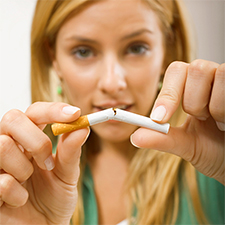YOU’VE INVESTED A LOT to get your ideal smile, so of course you want to keep it looking great for life. That’s why, as your orthodontic team, we want to address a habit that can destroy your smile, and even worse—threaten your health.
Did you know that smokers are twice as likely as non-smokers to lose their teeth? That’s not the worst of it, either.
Smoking wreaks havoc on your gums. It lowers your ability to fight infections in your mouth and compounds healing time. It increases the risk for periodontal disease. Smokers are even twice as likely to need root canals and more likely to develop cavities. And then, of course, there’s the fact that smoking is aesthetically very bad for your teeth, causing staining and significant wear and tear.
Most Of All…
Smoking is the biggest controllable risk factor for oral cancer. An oral cancer study in the UK concluded that 70% of oral cancer cases in men, and 55% of oral cancer cases in women, were caused by smoking.
What Can You Do To Guard Against Oral Cancer?
First and foremost, reduce your risk factors:
- Smoking is the #1 risk factor. Stop. And to our young patients: don’t start.
- Smoking and drinking together is worse than either one alone. Be smart.
- Some strains of HPV are related to oral cancer. Practice safe habits.
Know the signs:
Unfortunately, oral cancer still occurs in people without any typical risk factors. So even if you don’t smoke, you need to know the signs of oral cancer, including:
- A red or white sore in your mouth that does not go away after two weeks
- Unexplainable pain or numbness in your mouth
- Difficulty swallowing
Have regular oral cancer screenings.
By examining the tissues in your mouth, your dentist can spot the signs of oral cancer early, making successful treatment much more probable.
The best way to be safe is to quit smoking—end of story, no exceptions.
As your health care professionals, we encourage you to cut your risk for this life-threatening disease by cutting smoking out of your life.
You can learn more at oralcancerfoundation.org or mouthcancer.org.
If you have any questions about reducing your risk factors, or what to expect during an oral cancer screening, contact us.



